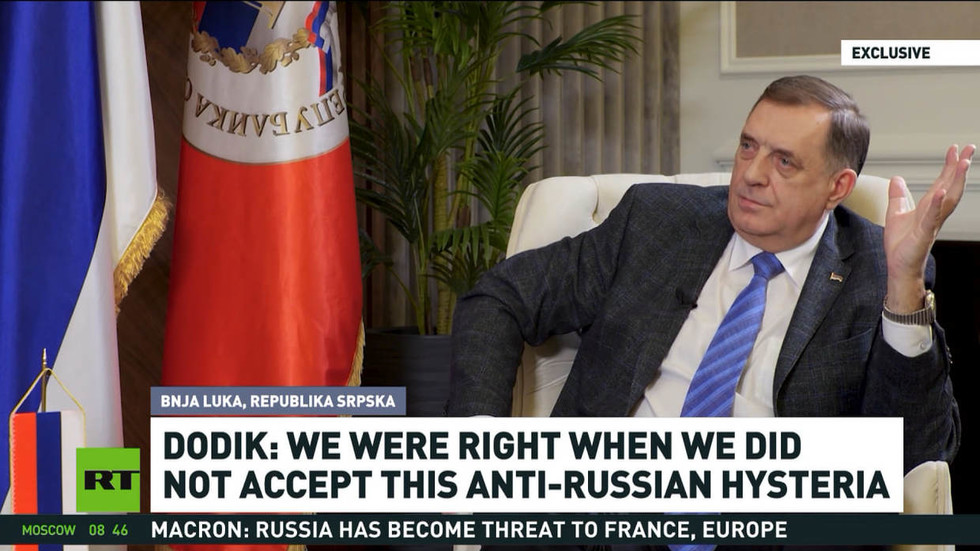A Surprising Stance: Bosnian Serb Leader Challenges Anti-Russian Sentiment in Ukraine
In a world increasingly polarized by political divides, the statements from Milorad Dodik, the Bosnian Serb leader, have sent ripples through the fabric of Eastern European politics. His assertion that the anti-Russian sentiment prevalent in Ukraine is “unnatural” invites a broader examination of regional relationships, historical grievances, and identity politics. This provocative stance not only highlights the complexities of post-Soviet relations but also raises questions about the nature of nationalism and solidarity among Slavic nations.
The Context of Dodik’s Statements
To fully grasp the implications of Milorad Dodik’s comments, it’s essential to consider the current geopolitical landscape. Ukraine’s ongoing conflict with Russia, which intensified following the annexation of Crimea in 2014, has engendered a strong wave of nationalism and anti-Russian sentiment within Ukraine. This sentiment is fueled not just by the conflict but also by a desire for European integration and alignment with Western democratic values.
Dodik’s remarks come against a backdrop of his own controversial leadership in the Republika Srpska, the Serb-dominated entity within Bosnia and Herzegovina. His position often aligns closely with Russian interests, making his comments both strategic and revealing. By challenging the anti-Russian narrative, Dodik seems to be advocating for a re-evaluation of regional alliances, suggesting that shared Slavic heritage should transcend recent political conflicts.
Understanding the “Unnatural” Sentiment
When Dodik refers to the anti-Russian sentiment in Ukraine as “unnatural,” he likely means that it contradicts historical and cultural ties that exist between Ukrainians and Russians. Many in the Balkans, including Dodik, view the Russian influence as a stabilizing force against Western encroachment, particularly from NATO and the European Union. For them, rejecting Russia can feel like a rejection of a shared cultural identity.
This perspective leads to questions about the legitimacy of national identities formed in the wake of the Soviet Union’s collapse. In many cases, post-Soviet countries have redefined their identities in opposition to Russia, often to solidify their national unity and distance themselves from past imperial control. However, this has not come without its challenges, particularly in regions where ethnic and cultural ties with Russia are still strong.
The Regional Implications of Dodik’s Position
Dodik’s stance has significant implications for regional politics. By positioning himself against the tide of anti-Russian sentiment, he not only challenges Ukraine’s narrative but also reinforces his own power base in Republika Srpska. This could embolden other leaders in the Balkans who feel similarly about their ties to Russia, potentially leading to a re-alignment of political alliances.
Furthermore, Dodik’s comments could provoke a response from Ukrainian leadership, who may feel the need to reinforce their stance against Russian influence. This could lead to increased tensions in the region, as Ukraine may bolster its relationships with NATO and the EU to counteract the influence of leaders like Dodik.
Exploring the Historical Context
The historical context of Ukrainian and Russian relations is complex and fraught with conflict. The shared history dates back centuries, encompassing periods of both cooperation and strife. The Soviet era further complicated these relations, as policies of Russification and repression of Ukrainian culture sowed seeds of resentment.
As Ukraine sought independence in the early 1990s, the emergence of a distinct Ukrainian identity became paramount. This identity is often framed in opposition to Russian influence, particularly after the events of 2014. Dodik’s comments, therefore, can be seen as an attempt to challenge this narrative and assert a different interpretation of Slavic unity.
The Role of Nationalism and Identity Politics
Nationalism plays a crucial role in shaping the sentiments within both Ukraine and the Balkans. In Ukraine, the struggle against Russian aggression has galvanized national pride, leading to a resurgence of Ukrainian language and culture. On the other hand, Dodik’s remarks tap into a different form of nationalism—one that emphasizes a shared Slavic heritage over contemporary political divisions.
This duality highlights the broader question of how national identities are constructed and contested. For many, identity is a fluid concept, influenced by historical narratives, contemporary politics, and personal experiences. Dodik’s perspective challenges Ukrainians to reconsider the foundations of their national identity and the role that Russia plays in it.
The Future of Ukrainian-Russian Relations
Dodik’s challenge to anti-Russian sentiment in Ukraine may provoke deeper reflections on the future of Ukrainian-Russian relations. If leaders like Dodik can sway public opinion or at least spark debate about the nature of these relationships, it may lead to a reconsideration of how both nations view each other. The potential for a more nuanced understanding of shared history could emerge, albeit against a backdrop of ongoing conflict.
- Potential for Dialogue: Leaders across Eastern Europe may find common ground in discussing historical ties rather than simply viewing each other through the lens of current political conflicts.
- Impact on Regional Stability: A shift in sentiment could either stabilize or destabilize the region, depending on how these discussions unfold.
- Influence of External Powers: The role of the EU and NATO in shaping these discussions cannot be overlooked, as their influence continues to affect national policies.
Conclusion: Navigating a Complex Landscape
Milorad Dodik’s surprising stance on anti-Russian sentiment in Ukraine invites a complex re-examination of regional identities and political alliances. As the Balkans and Eastern Europe navigate the turbulent waters of nationalism and cultural identity, Dodik’s comments serve as a reminder of the intricate web of history that binds these nations together. Whether his challenge will lead to a reconsideration of anti-Russian attitudes in Ukraine remains to be seen, but it undoubtedly opens the door to vital discussions about the future of Slavic unity and cooperation.
In a time when political polarization is rampant, Dodik’s words may serve as a catalyst for dialogue, prompting both leaders and citizens to reflect on their identities and relationships. The path forward may require a delicate balance of acknowledging historical ties while addressing contemporary realities, ensuring that the voices of all parties are heard and respected.
See more BBC Express News

